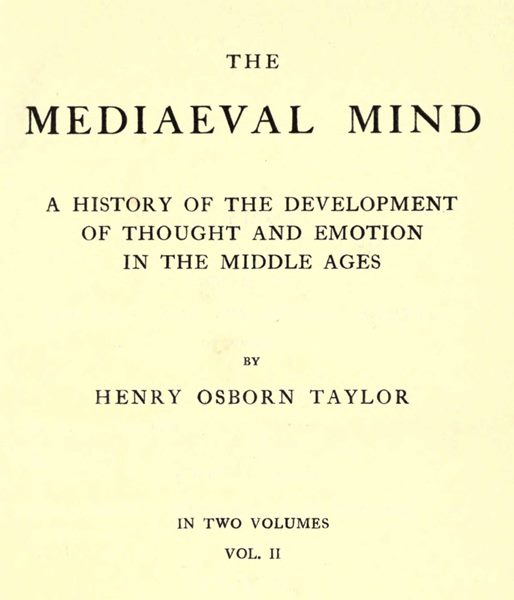The Mediaeval Mind (Volume II of II) / A History of the Development of Thought and Emotion in the Middle Ages

Author:Henry Osborn Taylor [Taylor, Henry Osborn]
Language: eng
Format: epub
Published: 2013-10-03T16:00:00+00:00
II
The greatest dialectician of the early twelfth century felt no problems put him by the physical world. That did not attract his inquiry; it did not touch the reasonings evolved by his self-consciousness, any more than it impressed the fervid mind of his great adversary, St. Bernard. The natural world, however, stirred the mind of Abaelard’s contemporary, Hugo of St. Victor.[481] Its colours waved before his reveries, and its visible sublimities drew his mind aloft to the contemplation of God: for him its things were all the things of God—opus conditionis or opus restaurationis;[482] the work of foundation, whereby God created the physical world for the support and edification of its crowning creature man; and the work of restoration, to wit, the incarnation of the Word, and all its sacraments.
Hugo was a Platonic and very Christian theologian. He would reason and expound, and yet was well aware that reason could not fathom the nature of God, or bring man to salvation. “Logic, mathematics, physics teach some truth, yet do not reach that truth wherein is the soul’s safety, without which whatever is is vain.”[483] So Hugo was not primarily a logician, like Abaelard; nor did he care chiefly for the kind of truth which might be had through logic. Nevertheless the productions of his short life prove the excellence of his mind and his large enthusiasm for knowledge.
As Hugo was the head of the school of St. Victor for some years before his death, certain of his works cover topics of ordinary mediaeval education, secular and religious; while others advance to a more profound expression of the intellectual, or spiritual, interests of their author. For elementary religious instruction, he composed a veritable book of Sentences,[484] which preceded the Lombard’s in time, but was later than Abaelard’s Sic et non. Without striking features, it lucidly and amiably carried out its general purpose of setting forth the authoritative explanations of the elements of the Christian Faith. The writer did not hesitate to quote opposing views, which were not heralded, however, by such danger-signals of contradiction as flare from the chapter headings of the Sic et non.
The corresponding treatise upon profane learning—the Eruditio didascalica—is of greater interest.[485] It commences in elementary fashion, as a manual of study: “There are two things by which we gain knowledge, to wit, reading and meditation; reading comes first.” The book is to be a guide to the student in the study both of secular and divine writings; it teaches how to study the artes, and then how to study the Scriptures.[486] Even in this manual, Hugo shows himself a meditative soul, and one who seeks to base his most elementary expositions upon the nature and needs of man. The mind, says he, is distracted by things of sense, and does not know itself. It is renewed through study, so that it learns again not to look without for what itself affords. Learning is life’s solace, which he who finds is happy, and he who makes his own is blessed.
Download
This site does not store any files on its server. We only index and link to content provided by other sites. Please contact the content providers to delete copyright contents if any and email us, we'll remove relevant links or contents immediately.
The remains of the day by Kazuo Ishiguro(8977)
Tools of Titans by Timothy Ferriss(8368)
Giovanni's Room by James Baldwin(7330)
The Black Swan by Nassim Nicholas Taleb(7109)
Inner Engineering: A Yogi's Guide to Joy by Sadhguru(6785)
The Way of Zen by Alan W. Watts(6601)
Asking the Right Questions: A Guide to Critical Thinking by M. Neil Browne & Stuart M. Keeley(5759)
The Power of Now: A Guide to Spiritual Enlightenment by Eckhart Tolle(5757)
The Six Wives Of Henry VIII (WOMEN IN HISTORY) by Fraser Antonia(5501)
Astrophysics for People in a Hurry by Neil DeGrasse Tyson(5182)
Housekeeping by Marilynne Robinson(4436)
12 Rules for Life by Jordan B. Peterson(4299)
Double Down (Diary of a Wimpy Kid Book 11) by Jeff Kinney(4261)
Ikigai by Héctor García & Francesc Miralles(4247)
The Ethical Slut by Janet W. Hardy(4242)
Skin in the Game by Nassim Nicholas Taleb(4239)
The Art of Happiness by The Dalai Lama(4125)
Skin in the Game: Hidden Asymmetries in Daily Life by Nassim Nicholas Taleb(3991)
Walking by Henry David Thoreau(3953)
